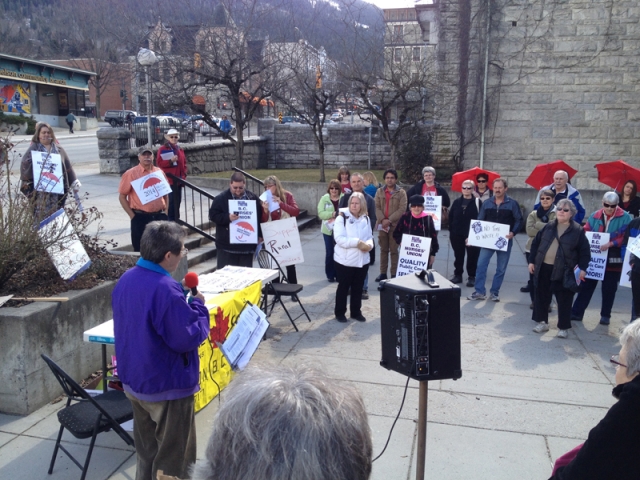Nelsonites call for Feds to return to table as Canada Health Accord expires
More than a hundred healthcare advocates rallied in the courtyard in front of Nelson City Hall Monday to protest the end of Canada’s 10-year-old, $41-billion health accord.
The rally was part of the National Day of Action for a new Health Accord to protect and strengthen public health care.
“Because (Prime Minister) Stephen Harper says there’s no role for the federal government in health care even though from the very beginning the federal government has always participated in health care,” Pegasis McGauley, Chairperson of Nelson Area Society for Health, said as to why Nelsonites joined rallies across Canada on the National Day of Action.
“The Canada Health Act is a federal piece of legislation and it’s one of the basis of Medicare in Canada,” McCauley added.
Monday, March 31, 2014, marked the end of the Health Council of Canada and the 10-year health accord that led to its creation.
The 2004 accord, a joint creation of the federal, provincial and territorial governments, was intended to force reforms and set national standards in areas such as primary care, wait lists and electronic health records, with strings attached to $41 billion in federal transfers and the council acting as watchdog.
The 10-year-old accord has now been replaced with a funding scheme set out by the federal government.
However, this new format has no conditions attached, leading critics to charge that the Harper government is dismissing its leadership responsibilities in shaping the direction of the health system.
“That’s certainly what provinces want,” McGauley confessed. “They’ve said we need the federal government here or there’s no national standard . . . the poorer provinces will suffer even worse than richer provinces like Alberta, and BC to some extent.”
McCauley said the current system allowed everyone to receive the same treatment, no matter where he or she lives and who he or she is.
“The feds need to participate because they cover over the entire country,” McGauley said, adding polls asking Canadians if they like the present healthcare system has never dropped below 88 percent support of the current system.
“They can get the figures and research we need. They can make sure a pilot project working in St. Johns can be transferred to Calgary or Vancouver or wherever it needs to be. And without that it’s very piece-meal.
“Some research will continue to happen, sure, but it won’t happen in a systematic way that should cover all of it happening,” she added.
McGauley believes the recent shift away from the health accord by the Harper government is to open the doors on a two-tiered health system.
“(Prime Minister Harper) really does want to turn (healthcare) over to the people he knows and the people he knows are big business and that’s the one group of people who will benefit out of a two-tier medical system.”
























